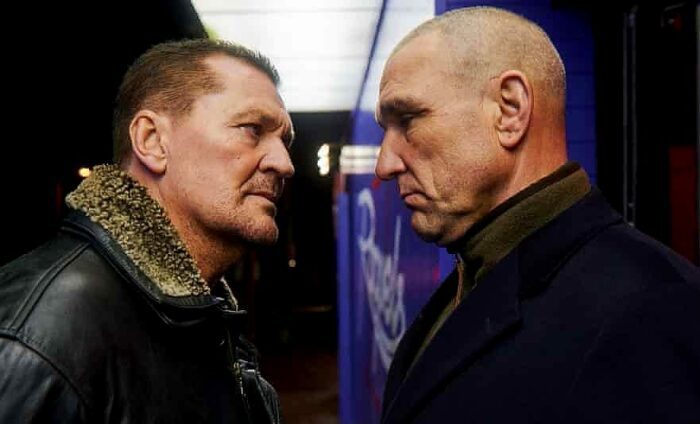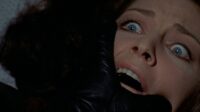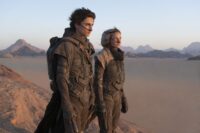In the tradition of Lock, Stock and Two Smoking Barrels and Snatch comes Rise Of The Footsoldier: Origins, the story of Tony Tucker (Terry Stone), a nightclub doorman who teams up with Essex heavyweight Bernard O’Mahoney (Vinnie Jones) at the height of the 1980s rave scene. Packed with fights, revenges, and explosions, the ultimate origin story brings full circle, and tackles many of the franchise’s unanswered questions.
Rise of the Footsoldier: Origins is scored by British composer Ross Power who creates a cinematic, adventurous sound harnessing the energy of the era-classic synths including the CS-80, DX7 and of course the Moog. Coupled with a contemporary production, live ’80s guitars and percussion, the score adds a unique sense of pace and emotion to the film whilst also signaling a recognizable sound to the viewer, enhancing the sense of familiarity and nostalgia.
Jason: Can you share a story with us about what brought you to this specific career path?
Ross Power: I grew up in the UK with a mother who played piano and a father who played folk music, so there was a lot of music in the house. I was fascinated with the notation of the Beethoven book she would play from, and I still have that fascination. I began taking lessons and wanted to become one of two things; either a film composer or a musical director for Broadway shows.
Jason: Did your musical inspirations differ when you were starting out as opposed to now?
Ross Power: I guess they developed. I was most impressed upon by the art form of film and film music, or how music could add depth to a piece of theatre. I have my favorite composers and they start with Beethoven, Rachmaninoff, Debussy, then you realize there’s so much more whether it’s a jazz musician you’re playing with that does something beautiful that you like. You build a collage of influences when you sit down to write a film score and they will come flooding in.
Jason: You’ve done a lot of commercial work. How do you tell a musical story in 30, 45 or 60 seconds?
Ross Power: That’s quite a distinct art form. You are there to move things along and the key in advertising is music is used to set off a set of nostalgic triggers so it could be a certain genre or style that triggers people into connect with a product and a greater world beyond the product. You have just a few seconds to get a genre of music across, so that’s step one. Then you can take the viewer on a journey through the harmony or melody and instrumentation where you can start with a violin and then progress to a full orchestra which can happen in 10-15 seconds if you want it to.
Jason: When you learned Rise of the Footsoldier: Origins is set in the ’80s, did your mind already start racing? You had this ’80s sandbox of sounds to use.
Ross Power: It was quite interesting for as a film composer because until that point I’d never thought about writing in a specific genre or period and the ’80s is a vast musical expanse with genre. You still had disco and funk in the ’80s, so when we talk about the ’80s we’re talking about this dark wave of sound such as Blondie, it’s quite a specific area. This is a dark film, so it was about taking the right bits of the ’80s which I found interesting. What I had to create was something that sounded like the ’80s but was still modern to tell the story. Some aspects of the ’80s prohibit you from being as expressive as you’d like, so the challenge was reducing the canvas into the idiom that was this dark wave ’80s style while keeping the emotional story going along.
Jason: What did you use to get illustrate that sound?
Ross Power: For me, live music is incredibly important but inevitably for a period such as this you are going to use a lot of synths. I have a Moog in the studio that I use; I run through a series of guitar pedals and delays and reverbs so I created a lot of the sounds you hear on the soundtrack using the Moog. If you want a harsher or softer sound, bright or dull, anything like that. Actually, it’s quite an orchestral instrument because you can really muck around and play with the techniques of the instrument. The operation of it is not dissimilar to writing for an orchestra except I had to program it all myself and I had some other synths that I was using as well, the CS80, the DX7, which is quite typical of that era. You hear the sounds of those synths and you go, ‘ah, yes. That’s the ’80s’ or for us, the more specific part of the ’80s we go to.

Jason: Is it tricky to find a balance between the classical and modern instruments?
Ross Power: The ’80s of course had loads of great guitar sounds so there’s lots of guitar in this. A colleague of mine, Charlie Moreland, came and played for me. He’s a phenomenal guitarist. I also had a percussionist because often with the synths, you just need a bit of human groove just to bring it to life. The most challenging parts of scoring with electronics are the subtleties. The director, was very keen that when music came in, it should be heard and sound like the beginning of a track that you would hear in the ’80s and not too much like a classic underscore although there were moments where we needed that My favorite thing to do as a composer is to mix electronic with organic. In our world, we’re used to both sounds and it’s quite exciting.
Jason: How do you balance character and atmosphere, especially in a movie such as this one?
Ross Power: I look back at a project like this and I say ‘how lucky was I? how much did I have to redo?’ and you try to be as proficient as possible because you haven’t got all the time in the world. You only have a set amount of time to get the score done. There were two cues where Nick Nevern, the director, suggested I try something else, but otherwise it was pretty plain sailing and he liked everything I did. The tricky part was balancing whether the music was playing to a hero or was it playing to another force in the movie and getting that right so it was audible. That was hard. We decided there would be certain moments where the music would come out full-frontal like it was a track from the ’80s and other times it just needed to creep in. There’s a moment in the film where a classic British ’80s car is torched and Vinnie Jones playing Bernard comes running out F-ing blinding angry and that scene has the full-frontal music. The next scene of Vinnie in a launderette is a dialogue scene, so there I used string techniques to create an eerie, horror vibe with melody from the previous scene underneath. Now you have a duality of scoring, so that was fun getting that to work.
Jason: Most of us are pretty aware of a composer’s role in a movie or TV project. Can you describe the role of a sound designer?
Ross Power: There are official roles with post-production and the sound designer is the guy who brings it all together and takes the different elements of the design sound. When you hear a door slam in a movie, it’s not the same door used during filming. The sound is changed not for dramatic effect but for creative effect. It’s taking all the sound elements which aren’t music and creating a score of sound. Some sounds are real but the fun is when you ask ‘how can I be creative with this? How can I use sound to pull us into the next scene?’ There are several moments in this movie where you have music building into a scene from the previous one. Obviously sci-fi projects lend themselves to more creative design than a more realistic story. What was important in this film was the brutality of the punches and kicks and violence. It’s a violent form but after a while it becomes a weird sense of normal.
Jason: What are some works as music producer you recall working on that you were happy to have worked on?
Ross Power: I’m pleased with this film. It gave the opportunity to do something different in a genre that was somewhere I would not normally have gone to. I’ve worked on a number of TV shows here in the UK that you’ll find on Netflix. One of my favorites is a series I did for Sky Arts called Great British Walks, which focused on six big British artists and the music could be very creative. We wrote about 40 different tracks for that. I recently enjoyed doing the Iceland advert for Gino D’Acampo and being inspired by the music of Ennio Morricone and I got to make it with some fabulous musicians. It was only 40 seconds, but we packed it full of Italian film score sounding material.
Jason: What are some of the most interesting or exciting projects you are working on now?
Ross Power: Nick Nevern is writing his next film which he asked me back for. I’m involved in director David Cohen’s big budget sci-fi film soon and sci-fi is one of my favorite genres, so that’s looking quite good.
Jason; Good luck with this and other projects.
Ross Power: Thanks so much. My pleasure.
Rise Of The Footsoldier: Origins opened in UK cinemas on Sept 3.


